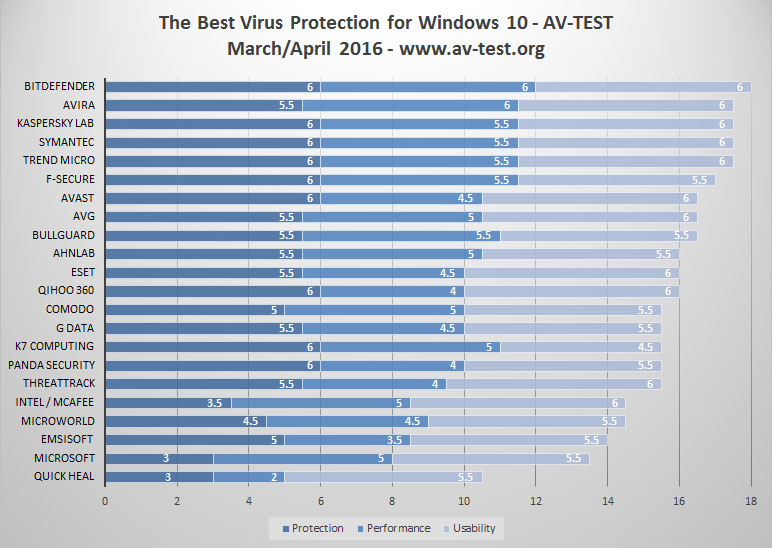McAfee, AVG Drop in Latest AV-TEST Antivirus Evaluations
Two well-known antivirus brands see their protection scores drop, while Microsoft's built-in Windows Defender slips only a little.
UPDATED May 31, 2016 with comment from Intel Security/McAfee.
The latest antivirus evaluations by German independent testing lab AV-TEST were released today (May 30), and once again, Bitdefender came out on top, closely followed by usual suspects Avira, Bitdefender, Kaspersky, Norton and Trend Micro.

The real news, however, were drops by two well-established brands, AVG and Intel/McAfee, and the not-abysmal performance of Windows Defender, which is slowly inching toward becoming a decent antivirus product, though one that still has a long way to go.
In last place was Quick Heal, an Indian brand whose scores have steadily declined since last year, and which came in a hair below Windows Defender.
MORE: Best Antivirus Software and Apps
Bitdefender Internet Security aced AV-TEST's evaluations, scoring six in the categories of Protection, Performance and Usability each, for a perfect total score of 18. It detected 100 percent of zero-day (previously unseen) malware in both March and April 2016, and stopped 99.9 percent of widespread (previously known) malware in March, and 100 in April.
Bitdefender does so well, so consistently on antivirus evaluations that it's kind of boring. The same could be said for Avira, Kaspersky Lab, Symantec Norton and Trend Micro, whose mid-range antivirus products each scored 17.5 out of a possible 18 in this round of tests.
Get instant access to breaking news, the hottest reviews, great deals and helpful tips.
Not so for McAfee Internet Security, which continued a slide seen in the past few AV-TEST rounds. It detected only 90.1 percent of zero-day malware in March, well below what we can recommend in an antivirus product. When what matters is not how much is stopped, but how much gets through, a 90 isn't an A minus, but an F.

To be fair, McAfee did stop 98.8 percent of zero-day malware in April, and nearly 99 percent of widespread malware in both months. But that's little consolation when so many products, including Avast Free Antivirus, do even better.
AVG, too, dropped in the rankings, stopping only 95.2 percent of zero-day malware in April. That's AVG Internet Security's worst score in more than a year. However, the product stopped 100 percent of zero-day malware in March.
Windows Defender detected 88.9 percent of zero-day malware in March, and 88.0 percent in April — hardly good, but better than the 49-percent detection rate its Windows 7 version had less than two years ago. Its widespread-malware scores were better, at 98.7 and 98.9 percent in March and April, respectively.
That's a bit of a drop from the past few Windows Defender rounds, in some of which it scored 90 percent or more against zero-day malware. But it shows a consistency that's eluded Microsoft's free, built-in antivirus software up until now.
MORE: Is Windows Defender Good Enough? Not Yet
Bringing up the rear was Quick Heal Total Security, which detected only 87.7 percent of zero-day malware in March, and 89.2 percent in April. Its scores against zero-day malware used to be much better, but have slipped in the past year. Quick Heal's widespread malware scores have stayed steady, ranging from 99 to 100 percent, but its zero-day scores have declined from the high 90's to the high 80's.
Once AV-TEST's system-performance and ease-of-use scores were factored in, Quick Heal Total Security got only 10.5 out of a possible 18 points. That's a full three points behind second-to-last Windows Defender, which, as usual, proved to be easy to use and have a moderate system impact.
As before, our recommended paid and free Windows antivirus products are Bitdefender Antivirus Plus and Avira Free Antivirus. Although these weren't the exact products tested in this latest round of AV-TEST evaluations, all Windows products in a single antivirus brand's line generally use the same malware-detection engines and will offer the same quality of protection.
UPDATE: Intel Security released a statement May 31 related to the evaluation performance of McAfee Internet Security.
"Intel Security has made several improvements to return our business and consumer AV-TEST score to higher levels, including implementing new machine-learning methods, expanding intelligence sources and improving classifications," the statement said in part. "We have seen immediate results, with our April internal efficacy measurements for file and web classification already showing strong improvements.
"Any existing small fluctuations in detection volume are the norm in the industry. The drop in AV-TEST scoring, as well as our internal quality metrics, happened during a narrow window of time, illustrating an anomaly rather than a trend."

Paul Wagenseil is a senior editor at Tom's Guide focused on security and privacy. He has also been a dishwasher, fry cook, long-haul driver, code monkey and video editor. He's been rooting around in the information-security space for more than 15 years at FoxNews.com, SecurityNewsDaily, TechNewsDaily and Tom's Guide, has presented talks at the ShmooCon, DerbyCon and BSides Las Vegas hacker conferences, shown up in random TV news spots and even moderated a panel discussion at the CEDIA home-technology conference. You can follow his rants on Twitter at @snd_wagenseil.
-
3ogdy McWho? Haven't they replaced their screwed up name and products with some Intel stuff? I thought they finally transitioned to Intel Security or something like that.Reply
Not at all surprised Bitdefender is number 1 though. Romanian and Russian security is well known in this industry. Usually, Top 3 security products are (in this order) : Bitdefender, Kaspersky, Norton. -
Dark Lord of Tech http://chart.av-comparatives.org/chart1.php?chart=chart2&year=2016&month=4&sort=0&zoom=2Reply
I use Kaspersky now , Bitdefender was slowing my system down and received several blue screens. -
daglesj Just run a Standard user account and you then negate 90% of stuff straight away without the need for AV.Reply -
Paul Wagenseil Reply18042791 said:McWho? Haven't they replaced their screwed up name and products with some Intel stuff? I thought they finally transitioned to Intel Security or something like that.
The company is using Intel Security for the manufacturer, but keeping McAfee in the name of the product -- for now. John McAfee's own antics haven't helped keep the brand name alive, though. -
Paul Wagenseil Reply18044412 said:Just run a Standard user account and you then negate 90% of stuff straight away without the need for AV.
Yeah, but the other 10 percent will use privilege escalation to get past the Standard account limitations.
-
Paul Wagenseil Reply18044411 said:http://chart.av-comparatives.org/chart1.php?chart=chart2&year=2016&month=4&sort=0&zoom=2
I use Kaspersky now , Bitdefender was slowing my system down and received several blue screens.
Kaspersky makes good stuff. It had some less-than-perfect scores in a recent AV-TEST round, but seems to have bounced back. We thought Kaspersky Total Security was the best of the premium AV products last year: http://www.tomsguide.com/us/kaspersky-total-security,review-2045.html
-
Dark Lord of Tech I was using Bitdefender for a couple of years , but switched over to Kaspersky , seems lighter and more responsive than the last two incarnations , I also tested Trend Micro on one of my machines , was very impressed .They are 1 and 2 most of the time.Kaspersky tolerates MBAM Premium , much better than Bitdefender.Reply
 Club Benefits
Club Benefits





